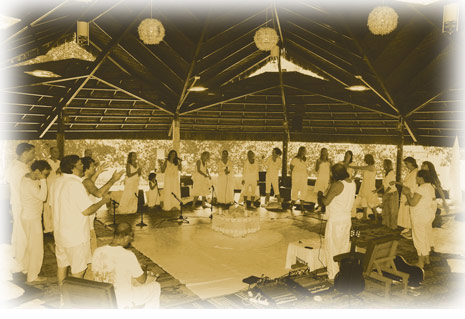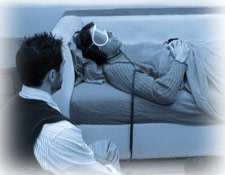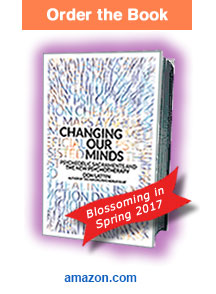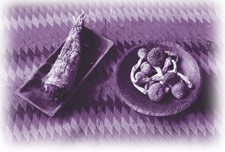 |
 |
||||||||||||||||||||||

What Some Leading
Lights Are Saying
About the New Book
Don Lattin has done compassionate service by bringing together the current work on the profound potential of psychedelics to treat addiction, fear of death, and physical and mental struggles. It has taken years but now researchers are able to use these methods to inquire into some of our most challenging issues, including, in fact, what it means to be human. This riveting report of these diverse explorations will certainly encourage others to expand the field.
– Mirabai Bush, Senior Fellow
Center for Contemplative Mind
in Society
Don Lattin’s Changing Our
Minds is far and away the best book on psychedelic use and research available today. Although I’m supposed to know all this stuff, my copy is clut-tered with underlinings, the margins speckled with exclama-tion points and emoji, and the front empty pages filled with notations of why I need to return to numerous pages. Through a combination of personal friendships, experiencing what he’s writing about, and just plain old-fashioned superior journalism, Lattin not only fully describes the important trends in research, but includes valuable back stories of the major researchers, and why they have given so much of their pro-fessional lives to such risky endeavors. Now, when people ask me, is there one book I can read about the multiple dimensions of current psychedelic research, I can say, Changing Our Minds will give you everything you need.
— James Fadiman, PhD, author of The Psychedelic Explorer’s Guide — Safe, Therapeutic and Sacred Journeys
Accurate, Comprehensive, and Powerful; If you want to under-stand the responsible use of psychedelics and feel its pulse, this book is for you.
— William A. Richards, Johns Hopkins School of Medicine
Of Sacred Knowledge: Psyche-delics and Religious Experiences
Changing Our Minds expertly explores the healing and spiritual journey catalyzed by psychedelic psychotherapy through the courageous voices of those who are pioneering the study of these treatments. An essential read for those interested in the expanding field of psychedelic research for therapeutic and spiritual uses, this volume lands at a crucial time during the re-emergence of psychedelic research as we approach the mainstream, scientific acceptance of psychedelic psychotherapy and the reintegration of the legal use of psychedelics into Western culture.
— Rick Doblin, PhD., Founder & Executive Director of MAPS,
the Multidisciplinary Association for Psychedelic Studies
Don Lattin tells the amazing stories about the rise of psychedelics, their benefits, and their colorful and inspiring champions, all the while retaining his journalistic voice. Changing Our Minds will be an important reference for generations to come.
— Allan Badiner, editor, Zig Zag Zen Buddhism and Psychedelics

Changing Our Minds
Psychedelic Sacraments and
the New Psychotherapy
Synergistic Press, Spring 2017
Changing Our Minds is an experiential tour through a social, spiritual and scientific revolution that is redefining our culture’s often confusing relationship with psychoactive substances. Veteran journalist Don Lattin chronicles the inspiring stories
of pioneering neuroscientists, psychotherapists, spiritual leaders
and ordinary people seeking to lead healthier lives by combining psychedelic drugs, psychotherapy,
and the wise use of ancient plant medicines.

Fifty years after psychedelic culture first flowered in the 1967 “Summer of Love,” a new era of exploration has begun.
In ground-breaking clinical trials, specially trained therapists employ Ecstasy (MDMA) to help U.S. veterans struggling with the psychological aftermath of war. Other psychiatrists in government-approved research offer psilocybin, the active ingredient in magic mushrooms, to alcoholics trying to get sober and to cancer patients struggling with the existential distress of a life-threatening illness. Mean-while, new imaging technology has enabled neuroscientists to map the psychedelic brain in real time, deepening our understanding of human consciousness.
This new wave of psychedelic study is both scientific and spiritual. Holding center stage in the shamanic revival is ayahuasca, a psychedelic tea brewed from two Amazonian plants and ritually used to promote spiritual and psycho-logical insight.
In the United States, the ayahuasca gospel is preached on two fronts. The first is via an underground network led by spiritual guides, some of them trained by South American shamans. The second front is a missionary movement launched by two Brazilian churches that use ayahuasca in their religious rites. They have established congregations in the United States that, under the limited protection of a 2006 Supreme Court ruling, can legally dispense this psychedelic communion.
Research into beneficial uses for LSD, mescaline and psilocybin dates back to the 1950s and early 1960s. Those studies were interrupted by a political backlash against liberation movements
 fueled, in part, by those very mind-expanding substances. That crackdown stopped the advance of psychedelic science for most of the 1980s and 1990s, but the times, they are once again changing.
fueled, in part, by those very mind-expanding substances. That crackdown stopped the advance of psychedelic science for most of the 1980s and 1990s, but the times, they are once again changing.
In 2017, two organizations lead-ing the second psychedelic revolution are poised to begin a final round of government-approved clinical trials in which hundreds of patients with post traumatic stress disorder, depression, substance abuse, or severe anxiety will undergo psychotherapy sessions fueled by MDMA and psilocybin. Scientists and donors affiliated with those organizations, the Heffter Research Institute and the Multi-disciplinary Association for Psychedelic Studies, have formed and funded two new organiza-tions that hope to bring those psychoactive compounds out of the research lab and into the medical mainstream.

Advocates of both the therapeutic and the spiritual use of psychedelics are already celebrating the start of the “post-Prohibition era.” That party may be a bit premature, but the government is certainly more open to scientific research into beneficial uses for these drugs and to the idea that at least some citizens have a right to explore these realms in religious rites.
The medicalization of marijuana may be the model for changing attitudes and public policies regarding psilocybin, MDMA and similar substances. On the cannabis front, that shift came as a state-by-state decriminalization of medicinal marijuana followed by full legalization in some states.
Continue on next page
©2009
info@riovi.com
510 654-5355